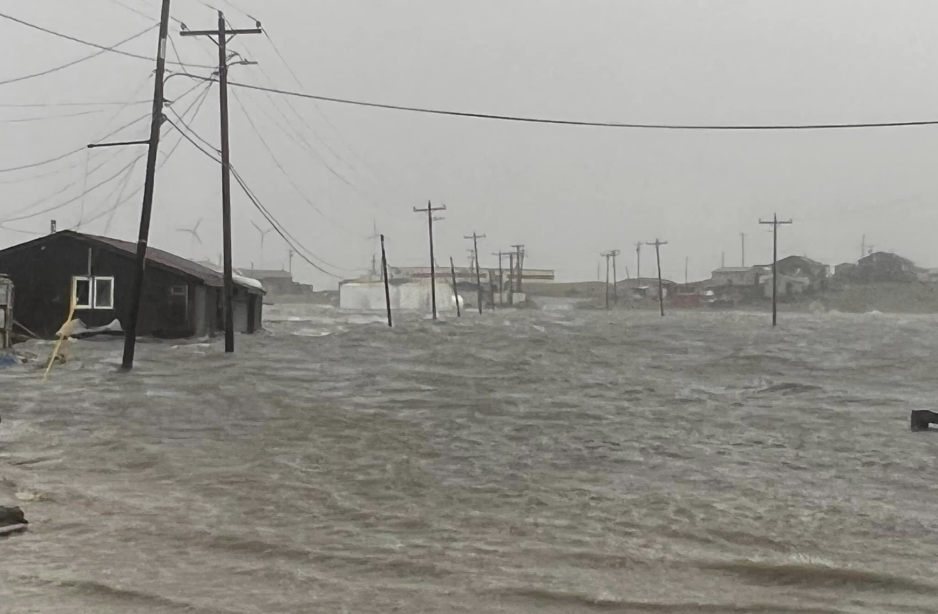Arne O. Holm says I Was Going to Nome, Alaska, but Climate Disruption Got in My Way

The storms are hitting Alaska's population more frequently. The remnants of Pacific Typhoon Merbok reached coastal Alaska on Friday, resulting in devastation and flooded streets in Hooper Bay, Nome, Alaska. (Photo: Ervin Chayalkun)
(Commentary) I was going to Nome, Alaska, next week. As a Norwegian newspaper, we are quite unique in reporting from Arctic America. This time, climate change put an end to my trip to the roadless gold mining town west in the American state.
The other day, High North News wrote about the Russian Pacific Fleet which carried out several rocket launches in oceans north of Alaska. The exercise was a part of Russia’s strengthening of its military presence and expertise in the Arctic.
Or, as a part of the defense of Arctic Russia, if you like. That is the wording Russia itself uses, a choice of words that infer that the Russian Arctic is under threat.
Equipped with nuclear weapons
In any case, the truth is that the oceans north of both Alaska and Russia are no longer covered with ice. Where the sea ice once formed a protective fortress around the coasts in the north, today there are open waters.
The protection is no longer there.
Russia’s strategic submarines, equipped with nuclear weapons, are more vulnerable than before. These are the same nuclear weapons Vladimir Putin threatened to use in his last speech on Wednesday.
He must have known that Pakistan’s population was drowning.
Many of them are placed just a few kilometers past Norway’s border to Russia.
Climate change, with its melting sea ice, is changing the security policy situation in the Arctic. Combined with a belligerent and aggressive Russia, the development is frightening.
Off the coast of Alaska, military activity is increasing while climate change is hitting the people in the Arctic with full force.
Just under a week ago, a historic storm raged along the coast of Alaska. Together with 40-something communities, cities like Nome and Unalakleet were brutally hit. The storm hit so hard that a state of disaster was declared.
The worst in 50 years
The floods and storms of the last few days have been the worst in 50 years. But Governor Mike Dunleavy could inform us that parts of Alaska have been hit by catastrophic storms 20 times since 2018. The situation has especially worsened in the last year.
The pictures published from the roadless communities in Alaska clearly reveal how climate change threatens the populations in many places.
A few days before disaster hit Alaska, one of Norway’s richest men stood on a stage in Oslo and took a fierce stand against those who want to reduce emissions of greenhouse gases through reduced consumption and production of fossil fuels.
Ripples in the swimming pools is the closest some of them come to a climate-induced storm.
He probably does not care about what is happening in Alaska at the same time, but he must have known that Pakistan’s population was drowning, while he himself was drowning in applause.
The speech, which could have been given anywhere where the rich assemble, was met with an ovation from people loaded with stocks and securities in the oil industry. The serious part of the oil industry, which is willing to take on a responsibility that extends beyond their own wallets, must have felt awkward.
The paradox
The paradox is that both Alaska and the northern part of Russia strongly contribute to the emissions which melt the ice and ruin the livelihoods of the people who live there.
I was going to Nome, Alaska, next week to meet people threatened by climate change, but who simultaneously depend on the income that oil brings to the American state. These meetings will not happen.
The few hotels that have not nailed shut their doors and windows, or the restaurants that did not burn down, were quickly filled by rescuers and people who had lost their houses to the flood and storm.
There was no room for a journalist from a country where climate deniers are greeted with roaring applause when they take the stage.
Ripples in the swimming pools and patio furniture taken by the wind is the closest some of them come to a climate-induced storm.
Also read
This commentary was originally published in Norwegian and has been translated by Birgitte Annie Molid Martinussen.



